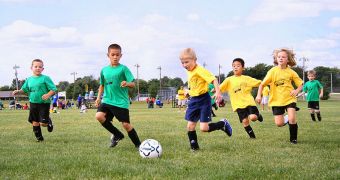Swedish researcher Stefan Wagnsson announced during the dissertation speech he gave at the Karlstad University that sports, regardless of whether they were individual or team-based, did not contribute to the formation of character and personality of small children as much as first thought. The researcher said that the psychological and social development of children and teenagers depended on sports to a little extent, and that the correlations might have been greatly exaggerated in past investigations.
The new work revolved around a batch of 1,200 children and teenagers, aged between ten and 16. The researchers had conducted the survey for around two years. At the end of each year, they asked the participants to gauge factors such as their sense of self, their physical and social abilities, their health, how often they drank alcohol or smoked, as well as how often they acted ethically, AlphaGalileo reports. The main separation criteria that was used on the group was whether or not they belonged to a sports club, the Karlstad team explained.
“Sports […] functions partly as an arena for social selection, where children and adolescents with already well-developed characteristics are more likely to start playing a sport, while young people with less well-developed characteristics often give up on sports. This leaves children and adolescents with more positive psychosocial characteristics in organized sports. This shows that the activities pursued in various clubs don't have much of an impact on the development of young people,” Wagnsson said.
“Instead, this is determined by factors related to the children's gender, natural maturity, and ethnic and socioeconomic background. It is very probable that the character-building that takes place in the home and in school, where children and adolescents spend the largest proportion of their time, is what has the greatest impact on young people's psychological and social growth,” the expert added. The research also revealed that those in sports clubs tended to drink or smoke less, had a better perception of their social role, and also tended to be more healthy.
But statistical correlations also revealed that those in clubs tended to be part of privileged classes, as in families that had little to no issues. In this sense, Wagnsson added, it might be that children and teenagers who come from favorable environments are over-represented in club sports. The expert also revealed that, indeed, sports clubs tended to have a higher impact on children involved in sports, in terms of developing them physically and mentally. But he emphasized that the full potential had not yet been reached, and that many children were left outside.

 14 DAY TRIAL //
14 DAY TRIAL //